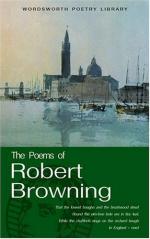|
This section contains 9,385 words (approx. 32 pages at 300 words per page) |

|
SOURCE: "Epiphany and Browning: Character Made Manifest," in PMLA, Vol. 107, No. 5, October, 1992, pp. 1208-21.
In the following essay, Tucker argues for the place of the concept of epiphany (or, "the moment of sudden illumination ") in literary criticism, particularly in the analysis of character construction in Browning's poetry. Tucker contends that Browning explores the use of "epiphanic faith" as a measure of character.
James Joyce minted a two-faced counter when he coined the term epiphany for literary use. "By an epiphany," he wrote of his alter ego, Stephen Dedalus, "he meant a sudden spiritual manifestation, whether in the vulgarity of speech or of gesture or in a memorable phase of the mind itself. It was for the man of letters to record these epiphanies with extreme care, seeing that they themselves are the most delicate and evanescent of moments" (221). Moment or record? Letter or spirit? On one side, a...
|
This section contains 9,385 words (approx. 32 pages at 300 words per page) |

|


